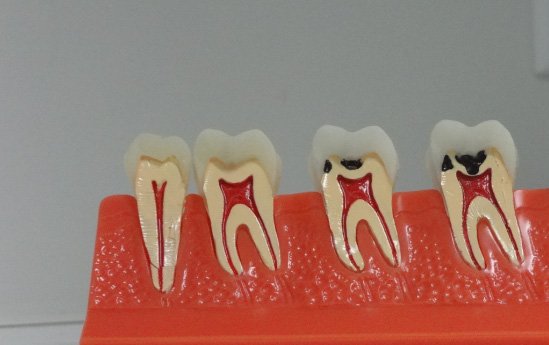Dental cavities are very common disease affecting many people from different ages. You will find here common questions and answers relating dental activities.
What are dental cavities?
Dental cavities are holes in the teeth caused by tooth decay, cavities can also be refereed to as caries.
How do cavities form?
Teeth are in an environment which is constantly under attack by acidic food and beverages, acidic food and beverages will ware down the protective layer of the teeth known as enamel. While this attack is occurring minerals are also reforming and being constantly replenished by mineral rich saliva, fluoridated water and toothpaste. When dimerization starts and in confined to the outermost layer of the tooth (enamel) it is called a microcavity or an incipient cavity. Only when the cavity breaks through the enamel layer into the dentin does it really threaten the tooth.
How to treat the dental cavity?
The ultimate goal of the dentist is to create a healthy balance between prevention and restoration, it’s a known fact that most people wait until they feel in the tooth before seeing a dentist. Once a tooth starts hurting it is very unlikely that you will be able to fix the problem with remineralization or a small filling.
Why I get more cavities than others?
Some people are more prone to dental cavities than others, analyzing the patient’s history of cavities, current diet, and oral hygiene will help determine how much more likely one is to develop cavities. The two main factors that contribute to tooth decay is bacteria in the mouth and diet that consists of a lot of sugar and carbohydrates. There are over 500 different kind of bacteria in the mouth, the bacteria form with the saliva in the mouth which creates something called plaque that attaches to the teeth. Bacteria in the plaque actually convert the sugar into acid which in turn dissolves away the tooth structure causing holes or cavities.
What should I do about my cavity?
When a dental cavity advances deep into the tooth it may produce increased sensitivity to foods that are hot, cold, or sweet but it is important to remember that not all cavities cause pain. Cavities that appear on the front teeth are going to be easier for the patient to see, but ones that appear on the back teeth, or even in between the teeth will be hard to detect unless you are having discomfort. Whenever a cavity gets too big you will be left with a hole in the tooth or you may even find that pieces of the tooth are just breaking off.
Bronte Road family Dental is a local dental office in Oakville, ON. If you have any dental questions or concerns please feel free to contact us.




